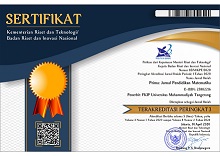Creative Thinking in Mathematics
Abstract
Creative thinking is important in increasing the formation and discovery of learning ideas in the 21st century. The 21st century is closely related to the era of the industrial revolution 4.0 which requires humans to have the ability to think more creatively and be able to accept rapid technological developments. Through education and learning, the ability to think creatively can be improved for the better. The ability to think creatively which is one of the cognitive abilities in learning activities needs to be developed. When the ability to think creatively develops, it will give birth to ideas, find interrelated relationships, create and carry out imaginations, and have many perspectives on things. Students who have high creative thinking skills tend to feel challenged and interested in solving various problems in learning. Interest in solving this problem also causes curiosity. A student with mathematical creative thinking has the ability to be able to solve problems he encounters in new or unusual ways. The tendency of mathematics teachers to dominate learning results in low student activity so that they do not provide opportunities to be directly involved in scientific activities. These conditions have an impact on students' limited opportunities to think creatively in finding new information or ideas from the learning process, it is necessary to increase creative thinking in learning which can be done in various ways.
Keywords
Full Text:
PDFReferences
Abdurashidovna, e. M. (2022). Metode pembentukan berpikir kreatif siswa dalam mengajar matematika di kelas dasar eshonqulova mushtariy abdurashidovna master , universitas pedagogi negeri termez , uzbekistan. Next scientists, 02, 323–326. Https://doi.org/https://doi.org/10.55640/eijmrms-02-11-70
Amidi, & zahid, m. Z. (2016). Membangun kemampuan berpikir kreatif matematis dengan model pembelajaran berbasis masalah berbantuan e-learning. Seminar nasional matematika x universitas negeri semarang 2016, 586–594.
Anggraena, y., felicia, n., g, d. E., pratiwi, i., utama, b., alhapip, l., & widiaswati, d. (2021). Kajian akademik kurikulum untuk pemulihan pembelajaran. Pusat kurikulum dan pembelajaran badan standar, kurikulum, dan asesmen pendidikan kementerian pendidikan, kebudayaan, riset, dan teknologi, 123. Https://repositori.kemdikbud.go.id/20029/1/buku merdeka belajar 2020.pdf
Dewi mardhiyan, e. O. W. S. (2015). Mengembangkan kemampuan berpikir kreatif dan rasa ingin tahu melalui model pembelajaran berbasis masalah. Https://journal.unnes.ac.id/sju/index.php/prisma/article/view/21686
Erawanto, u., & santoso, e. (2016). Pengembangan modul pembelajaran berbasis masalah untuk membantu meningkatkan berfikir kreatif mahasiswa. Jinop (jurnal inovasi pembelajaran), 2(2), 427. Https://doi.org/10.22219/jinop.v2i2.2629
Freiman, v., & tassell, j. L. (2018). Creativity and technology in mathematics education (volume 10). Springer. Https://doi.org/https://doi.org/10.1007/978-3-319-72381-5_1
Hanany, f. (2020). Berfikir kreatif dalam matematika. Http://journal.umpo.ac.id/index.php/silogisme
Hendriana, h., & fadhillah, f. M. (2019). The students’ mathematical creative thinking ability of junior high school through problem-solving approach. Infinity journal, 8(1), 11. Https://doi.org/10.22460/infinity.v8i1.p11-20
Kulsum, s. I., hidayat, w., wijaya, t. T., & kumala, j. (2019). Analysis on high school students’ mathematical creative thinking skills on the topic of sets. Journal cendekia: jurnal pendidikan matematika p-issn, 03(02), 431–436. Https://doi.org/https://doi.org/10.31004/cendekia.v3i2.128
Mardhiyana, d., & sejati, e. O. W. (2016). Mengembangkan kemampuan berpikir kreatif dan rasa ingin tahu melalui model pembelajaran berbasis masalah. Prisma, prosiding seminar nasional matematika, 1(1), 672–688.
Maskur, r., sumarno, rahmawati, y., pradana, k., syazali, m., septian, a., & palupi, e. K. (2020). The effectiveness of problem based learning and aptitude treatment interaction in improving mathematical creative thinking skills on curriculum 2013. European journal of educational research, 9(1), 375–383. Https://doi.org/10.12973/eu-jer.9.1.375
Maulana. (2017). Konsep dasar matematika dan pengembangan kemampuan berfikir kritis kreatif (p. 261). Upi sumedang press.
Meika, i., & sujana, a. (2017). Kemampuan berpikir kreatif dan pemecahan masalah matematis siswa sma. Jurnal penelitian dan pembelajaran matematika, 10(2), 8–13. Https://doi.org/10.30870/jppm.v10i2.2025
Ni, a. (2022). Upaya guru dalam meningkatkan kreativitas berpikir peserta didik di sekolah dasar. 6(2), 173–179.
Satriawati, g. (2017). The implementation of open-inquiry approach to improve students’ learning activities, responses, and mathematical creative thinking skills. Journal on mathematics education, 8(1), 103–114.
Suherman, s., & vidákovich, t. (2022). Assessment of mathematical creative thinking: a systematic review. Thinking skills and creativity, 44(january). Https://doi.org/10.1016/j.tsc.2022.101019
Syafitri pudji astuti, nita delima, m. A. R. (2016). Meningkatkan kemampuan berpikir kreatif matematis dan mengetahui motivasi belajar siswa dengan model pembelajaran berbasis masalah. 4(02), 1–23.
Yaniawati, p., kariadinata, r., sari, n. M., pramiarsih, e. E., & mariani, m. (2020). Integration of e-learning for mathematics on resource-based learning: increasing mathematical creative thinking and self-confidence. International journal of emerging technologies in learning, 15(6), 60–78. Https://doi.org/10.3991/ijet.v15i06.11915
Yeh, y. C., & lin, c. F. (2015). Aptitude-treatment interactions during creativity training in e-learning: how meaning-making, self-regulation, and knowledge management influence creativity. Educational technology and society, 18(1), 119–131. Https://eric.ed.gov/?id=ej1102711
DOI: http://dx.doi.org/10.31000/prima.v7i2.8528
Article Metrics
Abstract - 1547 PDF - 1061Refbacks
- There are currently no refbacks.
Prima: Jurnal Pendidikan Matematika
Program Studi Pendidikan Matematika
Fakultas Keguruan dan Ilmu Pendidikan
Universitas Muhammadiyah Tangerang
Jl. Perintis Kemerdekaan I/33, Cikokol
Kota Tangerang, Indonesia
e-mail: primajpm@gmail.com
Prima: Jurnal Pendidikan Matematika (p-ISSN: 2579-9827 | e-ISSN: 2580-2216) is licensed under a Creative Commons Attribution 4.0 International License.







